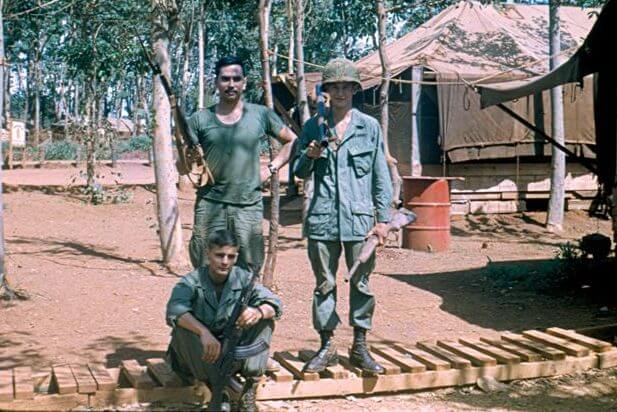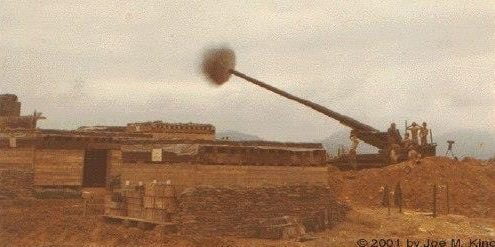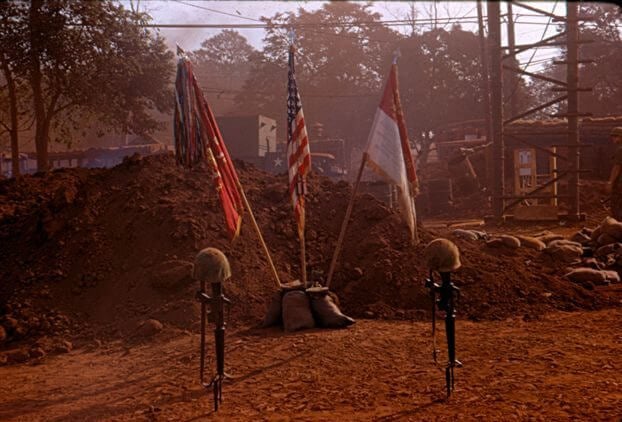
 A Minnesota PBS Initiative
A Minnesota PBS Initiative
The war in Vietnam was in high gear and I found himself in the heat and humidity of that foreign place in December 1967 along with several hundred other new and very uncertain replacements.
"You're standing there and you have no idea what to expect," The Army assigned me to the 1st Battalion, 5th Artillery, 1st Infantry Division, headquarters at Quon Lai. The headquarters camp was not fancy. "Your barracks are sandbags with a tent over them," Dave explained. The new guys filled sandbags for two weeks. "I didn't know that's what they did to acclimate you to the Vietnamese weather,"

The 1st Battalion, 5th Artillery had 105mm and 155 mm howitzers as well as 4.2 inch mortars which they fired in support of Army operations in the surrounding region.
I cross-trained in many jobs at Quon Lai and in the field at the battalion's fire bases. "The one thing you learn in Vietnam very quickly is that there is no 'I'," "You've got to count on everyone around you - it's all teamwork." Despite the cross-training, I continued my primary function as a wireman. I ran wire off seventy-five pound spools from firing batteries to the command posts where the unit had an old-fashioned switchboard set up.

When possible, I ran the wire in trees or on poles. Climbing poles in a combat zone, however, posed unique dangers as I discovered one day when I was high on a pole and enemy artillery began landing.
I hugged the pole and slid to the ground, picking up enormous slivers and losing hunks of my skin along the way.
Much of my time with the 1st Battalion, 5th Artillery was spent in the field away from the battalion headquarters camp. I probably went in the field two weeks out of each month, We were always moving around, The soldiers dug a shallow hole in the sandy soil and then filled sandbags to line the hole and build up walls.
"We had no water to bathe, you had your steel pot for shaving or whatever. Your clothes rotted off you, basically. Helicopters periodically dropped off a bundle of uniforms that the troops would sort through for their size. Meals were similarly rugged. When you are way out in the field, you are on C-rations.
Everything went to slow motion. I was running and it felt like my feet were lead. I was busy pulling guys back to the medics off the wire. There were dead and injured soldiers all over the fire base. You're covered in blood. I was running through puddles of blood everywhere.
The Viet Cong insurgents and North Vietnamese Army soldiers proved an elusive enemy. You almost never saw enemy soldiers, but Halloween of 1968 proved an exception to that rule. It also proved to be a life-changing night for me.
It was the middle of the night when all at once the whole war ended up at Fire Base Rita. A force of over 800 North Vietnamese soldiers attacked the fire base with mortars, artillery and infantry assaults. I crawled from my bunker to the command bunker where medics were treating the battalion commander, Lt. Col. Charles Rogers, for a shrapnel injury.

Rogers directed me back outside, saying I would know what to do. The fire base was under heavy attack and the explosions and firing was deafening. They (enemy soldiers) were coming over the wire, The hand-to-hand combat training he had received had seemed useless at the time, but now proved essential to survival.
The howitzer crews were frantically defending the fire base. We were firing direct fire beehive rounds. They are little metal flechettes, like buckshot. We were stopping them, but they were crawling over their own dead they had wiped out half of the infantry on the outside."
Everything went to slow motion. I was running and it felt like my feet were lead. I was busy pulling guys back to the medics off the wire. There were dead and injured soldiers all over the fire base. You're covered in blood. I was running through puddles of blood everywhere."
Rogers was wounded two more times, but continued directing the defense of the fire base from his stretcher. A piece of shrapnel knocked my helmet off and I just kept on moving with the adrenaline in me. Air strikes in the morning finally drove the remaining attackers off.
Rogers was awarded the Congressional Medal of Honor for his actions. I received a Bronze Star for my actions. "When it was over you felt a pride and a loss at the same time, The evidence of loss was all around.
You look over and there are all these body bags lined up, The survivors whose injuries did not require medevac stayed at the fire base. The choppers took out the wounded and the dead and brought back newcomers," Dave explained.
"You're 19 years old, but you feel a lot older than these (replacements) and they're only months younger than you, I completed his 365th day less than two months later and reported for my flight home. I remembered thinking, "Here we go again with this field of khaki uniforms waiting to get on an airplane." I watched four aircraft pull up before he boarded his plane. "When it gets off the ground," he remembered with a smile, "you hear the biggest cheer in the world." Anti-war protesters greeted our flight in California. I remembered my reaction as a 19-year-old just returning from combat: I went from pride to ashamed in two minutes."
Dave returned to Minnesota for leave, but recurring nightmares from the fire base assault put him in a psychiatric hospital during his leave. He received additional medical treatment from the Army and ended up reenlisting as a ground surveillance radar technician. The Army sent Dave for a second tour in Vietnam in the summer of 1970. He reported to the 69th Maintenance Company (general support) at the huge base at Cam Rahn Bay. This assignment was to a very different world than his first tour in Vietnam. I had my own jeep and my own driver and we'd go out to repair radars. I thought, this wasn't even like Vietnam, it was like a vacation."
My final Army assignment was to Hanau, Germany. My former battalion commander had retired in Germany, so Dave visited him. I was the first enlisted guy he had talked to about the fire base, I was discharged in 1975, but did not return to Tracy. I just traveled. Looking for me or seeing the U.S., I don't know which."
Many years later I returned to Tracy. I became a very proud Vietnam vet, but it took years to get there."
Story Themes: 1/5 Artillery, 1967, 1968, 1969, 1970, 1971, 1972, 1973, 1974, 1975, 1st Infantry Division, Army, Bronze Star, Charles Rogers, Combat, Coming Home, Congressional Medal of Honor, DAV, Dave Ziemke, David Ziemke, Disabled American Veterans, First Impressions, Food, Lai Khe, Quan Loi, Read, Tracy